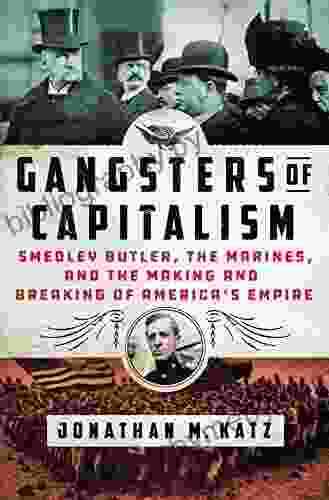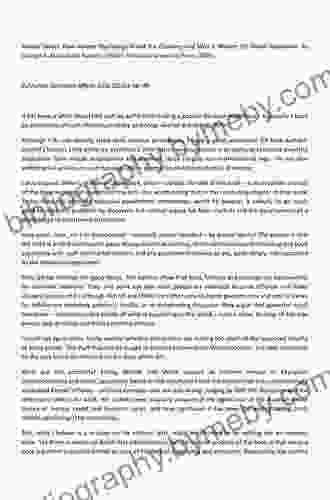How Human Psychology Drives the Economy: A Deep Dive into the Psychological Foundations of Global Capitalism

4.5 out of 5
| Language | : | English |
| File size | : | 1785 KB |
| Text-to-Speech | : | Enabled |
| Screen Reader | : | Supported |
| Enhanced typesetting | : | Enabled |
| Word Wise | : | Enabled |
| Print length | : | 254 pages |
The economy is a complex and dynamic system that is constantly shaped by a multitude of factors. While traditional economic models often focus on rational decision-making and market equilibrium, a growing body of research suggests that human psychology plays a crucial role in driving economic behavior and outcomes.
This article explores the psychological dynamics that underpin the economy, drawing on insights from psychology, economics, and behavioral finance. We will examine how emotions influence financial markets, how social norms shape consumption patterns, and how cognitive biases affect investment decisions. Understanding these psychological forces is essential for policymakers, business leaders, and investors alike, as it provides valuable insights into the drivers of economic growth, market volatility, and consumer behavior.
The Role of Emotions in Financial Markets
Emotions play a significant role in financial markets, influencing both individual and collective investment decisions. Fear and greed are two of the most powerful emotions that drive market behavior. When investors are fearful, they tend to sell their assets, leading to market downturns. Conversely, when investors are greedy, they tend to buy assets, leading to market rallies.
Other emotions, such as overconfidence and optimism, can also have a significant impact on financial markets. Overconfidence can lead investors to take excessive risks, while optimism can lead them to underestimate the potential for losses. These emotions can contribute to market bubbles and crashes, as investors become overly enthusiastic or pessimistic about the prospects of a particular asset or market.
The Impact of Social Norms on Consumption Patterns
Social norms play a powerful role in shaping consumption patterns. People are influenced by the behavior of others, and they often conform to the norms of their social group. This can lead to the spread of consumption trends, as people adopt new products and services that are popular among their peers.
Social norms can also affect the demand for luxury goods. People may buy luxury goods to signal their status or to fit in with a particular social group. This can create a cycle of conspicuous consumption, as people compete with each other to display their wealth and social standing.
Cognitive Biases and Investment Decisions
Cognitive biases are systematic errors in thinking that can lead to irrational investment decisions. These biases are caused by the way our brains process information and make decisions. Some of the most common cognitive biases that affect investment decisions include:
- Confirmation bias: The tendency to seek out information that confirms our existing beliefs.
- Hindsight bias: The tendency to believe that we could have predicted an event after it has already happened.
- Overconfidence bias: The tendency to overestimate our own abilities and knowledge.
- Loss aversion bias: The tendency to feel the pain of losses more strongly than the pleasure of gains.
These cognitive biases can lead investors to make poor investment decisions, such as buying stocks that are overpriced or selling stocks that are undervalued. They can also lead to excessive risk-taking and poor portfolio diversification.
Human psychology plays a crucial role in driving the economy and shaping economic outcomes. Understanding the psychological dynamics that underpin the economy is essential for policymakers, business leaders, and investors alike. By leveraging these psychological forces, we can create a more prosperous and sustainable global economy.
Here are some ways to leverage human psychology for economic prosperity:
- Promote financial literacy: Educate people about the risks and rewards of investing, and encourage them to make informed investment decisions.
- Encourage saving: Create tax incentives and other policies that encourage people to save for the future, which can help to reduce economic inequality and promote long-term economic growth.
- Foster a culture of entrepreneurship: Support small businesses and startups, which are often the drivers of innovation and economic growth.
- Promote social cohesion: Create policies that promote social cohesion and reduce inequality, which can help to create a more stable and prosperous economy.
By understanding and leveraging the psychological forces that drive the economy, we can create a more prosperous and sustainable global economy for all.
4.5 out of 5
| Language | : | English |
| File size | : | 1785 KB |
| Text-to-Speech | : | Enabled |
| Screen Reader | : | Supported |
| Enhanced typesetting | : | Enabled |
| Word Wise | : | Enabled |
| Print length | : | 254 pages |
Do you want to contribute by writing guest posts on this blog?
Please contact us and send us a resume of previous articles that you have written.
 Book
Book Novel
Novel Page
Page Chapter
Chapter Text
Text Story
Story Genre
Genre Reader
Reader Library
Library Paperback
Paperback E-book
E-book Magazine
Magazine Newspaper
Newspaper Paragraph
Paragraph Sentence
Sentence Bookmark
Bookmark Shelf
Shelf Glossary
Glossary Bibliography
Bibliography Foreword
Foreword Preface
Preface Synopsis
Synopsis Annotation
Annotation Footnote
Footnote Manuscript
Manuscript Scroll
Scroll Codex
Codex Tome
Tome Bestseller
Bestseller Classics
Classics Library card
Library card Narrative
Narrative Biography
Biography Autobiography
Autobiography Memoir
Memoir Reference
Reference Encyclopedia
Encyclopedia Friedrich List
Friedrich List Sarah Moore
Sarah Moore Phillips Payson O Brien
Phillips Payson O Brien Negar Mottahedeh
Negar Mottahedeh Garth Williams
Garth Williams George Ochoa
George Ochoa Mark K Updegrove
Mark K Updegrove Stacy Thomas
Stacy Thomas Gene Kugach
Gene Kugach Gemma Mccrae
Gemma Mccrae Kimberly Smith Lukhard
Kimberly Smith Lukhard G G Snicket
G G Snicket Gary D Miner
Gary D Miner George Catlin
George Catlin Marie Benedict
Marie Benedict Garrett Sutton
Garrett Sutton Iain Yardley
Iain Yardley Kenneth Cline
Kenneth Cline Jared Blando
Jared Blando Gerson S Sher
Gerson S Sher
Light bulbAdvertise smarter! Our strategic ad space ensures maximum exposure. Reserve your spot today!

 Junichiro TanizakiUncover the Cognitive Divide: How Liberals and Conservatives Think - Third...
Junichiro TanizakiUncover the Cognitive Divide: How Liberals and Conservatives Think - Third... Thomas PowellFollow ·13.2k
Thomas PowellFollow ·13.2k Herman MelvilleFollow ·2k
Herman MelvilleFollow ·2k Hector BlairFollow ·16.5k
Hector BlairFollow ·16.5k Patrick HayesFollow ·12.4k
Patrick HayesFollow ·12.4k Ibrahim BlairFollow ·9.1k
Ibrahim BlairFollow ·9.1k Anton ChekhovFollow ·11.7k
Anton ChekhovFollow ·11.7k Gil TurnerFollow ·19.6k
Gil TurnerFollow ·19.6k Carter HayesFollow ·13.3k
Carter HayesFollow ·13.3k

 Brian West
Brian WestSmedley Butler: The Marines and the Making and Breaking...
: A Marine's...

 Gabriel Garcia Marquez
Gabriel Garcia MarquezIschia, Capri, Sorrento, Positano, And Amalfi: An...
Explore the...

 Felix Carter
Felix CarterAdorn Your Little Princess with Fleur Ange's Exquisite...
Welcome to the enchanting...

 Kelly Blair
Kelly BlairUnveiling the Secrets of the Historical Way and Fishermen...
Step into the pages...

 Angelo Ward
Angelo WardKnit the Cutest Thumbless Mittens for Your Little One:...
Prepare to be...
4.5 out of 5
| Language | : | English |
| File size | : | 1785 KB |
| Text-to-Speech | : | Enabled |
| Screen Reader | : | Supported |
| Enhanced typesetting | : | Enabled |
| Word Wise | : | Enabled |
| Print length | : | 254 pages |












